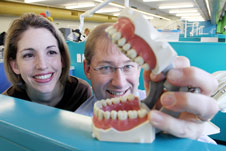 Wednesday 9 September 2015 10:44am
Wednesday 9 September 2015 10:44am
Dr Carla Meledandri (Chemistry) and Dr Don Schwass (Oral Rehabilitation). Photo: Sharron Bennett.
A new way to preserve caries-infected teeth and prolong the life of dental fillings has been developed at the University of Otago.
The technology uses specially-formulated, non-staining silver nanoparticles, invented through a partnership between the University's Department of Chemistry and Dental School, to arrest caries and make teeth more resistant to decay. The dentist applies the product after removing decay but before filling, and it diffuses into the tooth where it can kill any remaining bacteria that may cause further decay.
The Otago invention is unique because it does not discolour the teeth. All other available products that use silver to arrest caries turn teeth black, and therefore, they have not been widely accepted by patients or dental practitioners.
“We believe that our non-staining formula will be an important step forward for oral care and public health,” says Dr Don Schwass, Senior Lecturer and Prosthodontist in the Department of Oral Rehabilitation. “The result will be that recurrent caries will be significantly reduced and dental fillings will last longer, providing both economic and health benefits.”
“Our contribution has been to create stabilised nanoparticles of a certain size, using a unique method of production so that the end result is a clear, stain-free product,” says Dr Carla Meledandri, Lecturer in the Department of Chemistry.
Otago Innovation Ltd has recently licensed the rights to this invention to a global dental materials manufacturer for further product development.
For more information, contact:
Pete Hodgson
CE Otago Innovation
Tel 03 479 3872
Email enquiries@otagoinnovation.com
A list of Otago experts available for media comment is available elsewhere on this website.
Electronic addresses (including email accounts, instant messaging services, or telephone accounts) published on this page are for the sole purpose of contact with the individuals concerned, in their capacity as officers, employees or students of the University of Otago, or their respective organisation. Publication of any such electronic address is not to be taken as consent to receive unsolicited commercial electronic messages by the address holder.
